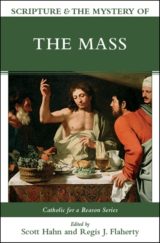By Leon J. Suprenant, Jr.
Leon J. Suprenant works for My Catholic Faith Delivered and is the author of and contributor to several books, including the Catholic for a Reason series.

It should be self-evident that Christ is the center of Christian living. After all, there is no salvation in any one else (Acts 4:12), and at the heart of the Gospel is the clarion call to follow Jesus, to become His disciples (Luke 9:23).
Those of us who have heard and accepted our Lord’s summons to follow Him are invited to an intimate, personal relationship with Him. Unfortunately, some Catholics may be put off by this “personal relationship” terminology. Yet, Christianity is not a mere moral code, ethnic club, or cultural phenomenon; rather, at its very core is the acceptance of Jesus Christ, the Son of God, as our personal Lord and Savior.
Such a relationship with our Lord necessarily entails a network of ecclesial, familial relationships. Those of us who come from large families (I’m the youngest of fourteen children) know firsthand how families can mushroom to such an extent that we can barely keep track of all our relatives. Yet, the reason we have these relationships at all is that we were born into the same family, that we share a common father. Similarly, our relationship with Jesus Christ is such that He empowers us to be children of God—His brothers and sisters by adoption (Rom 8:14–15).
So we have a relationship with our Lord that is both personal and familial. We also know that this relationship must be central in our lives. If a husband ignores his spouse, his marriage will suffer. If someone never communicates with her best friend, they will stop being best friends. Similarly, our Lord expects our full commitment to this relationship with Him. That is why in Scripture He harshly condemns indifference or tepidity: “I know your works: you are neither cold nor hot. Would that you were cold or hot! So, because you are lukewarm, and neither cold nor hot, I will spew you out of my mouth” (Rev 3:15–16).
But how do we live our personal relationship with Jesus Christ? We reach for Him, knowing that He is present to us in many ways. At any time, we can call upon Him in prayer. He is present in His Word, which is “living and active” (Heb 4:12). He is present where two or three are gathered in His name (Mt 18:20). He is present in the person of His apostles and their successors—namely, the Pope and bishops—such that those who hear them hear Christ (Lk 10:16). He is present in the poor and forgotten in our midst (Mt 25:34–40). All these and other ways of encountering Christ and nourishing our personal relationship with Him are legitimate and extremely important. But beyond these, we encounter Christ most fully, most intimately—Body, Blood, Soul, and Divinity—in the Eucharist. We say that He is most especially present in the Eucharist because such presence is not only spiritual, but tangible and corporeal (CCC 1374). Jesus is the “life,” and when we bodily receive our Lord, the “living bread,” in the Eucharist, we truly partake of and draw upon this supernatural source of life (John 6:51).
The Catechism calls the Eucharist the “source and the summit” of the Christian life, which is a synthesis of Vatican II’s teaching. This helps to put this issue in sharper focus. The Eucharist is the summit of Christian living. And “summit” assumes an upward orientation. To appreciate the “summit” most fully, we need to order our lives around the Eucharist, to ensure we are properly disposed to worthily receive the Sacrament. While weekly Mass is the “minimum,” more frequent participation is warmly encouraged by the Church, as is Eucharistic adoration outside of Mass.
The Eucharist is also the source of Christian living. As Jesus Himself says, “[A]part from me you can do nothing” (John 15:5). Nothing. Nada. Zilch. Each moment a living branch draws nutrients and life itself from the vine. Similarly, through the Eucharist, Jesus continually communicates to us His grace which is nothing less than the nutrients we need to sustain us in our daily Christian discipleship (John 15:1–6).
Even as we recognize the need for a personal relationship with our Lord and for nurturing this relationship, we must continually return to this point: it is God who initiates the relationship. God has first loved us, and our vocation is to respond to that love (cf. 1 John 4:10). And not only does God initiate the relationship, He even goes looking for us, to the point of becoming one like us in the Incarnation. Pope John Paul II beautifully expressed this insight in his Apostolic Letter on Preparation for the Jubilee Year 2000:
Christianity has its starting-point in the Incarnation of the Word. Here, it is not simply a case of man seeking God, but of God who comes in Person to speak to man of himself and to show him the path by which he may be reached. . . . In Jesus Christ God not only speaks to man but also seeks him out. The Incarnation of the Son of God attests that God goes in search of man. . . . It is a search which begins in the heart of God and culminates in the Incarnation of the Word. If God goes in search of man, created in his own image and likeness, he does so because he loves him eternally in the Word, and wishes to raise him in Christ to the dignity of an adopted son.
This awesome truth helps us to see the Eucharist in a new light. Before we enter God’s world as His beloved children, He first enters ours. Since the preeminent way that God remains in our world is through the Holy Eucharist, then the Eucharist must give us important clues as to why Christ assumed human nature in the first place (CCC 456–60). The Eucharist points not so much to God’s “inaccessible transcendence” as it does to the “divine condescension.”
You Might Also Like
From Genesis to Revelation, Scripture and the Mystery of the Mass explores the biblical roots of the Mass and the practical ways in which the mystery of the Eucharist affects our everyday lives. This volume includes essays by prominent Catholic scholars and apologists such as Scott Hahn, Jeff Cavins, Tim Gray, Kimberly Hahn, Curtis Martin, Edward Sri, Michael Barber, and others.


